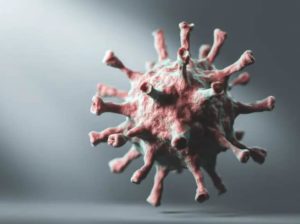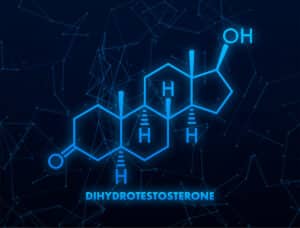The first thing to say is that losing hair is a completely normal physical process. Even a person with full hair growth loses up to 100 hairs a day. However, it becomes an issue when the hair that has fallen out suddenly stops growing back. This is when bald patches start appearing or hair starts to thin out.
Female hair loss therefore often means that women experience an associated loss of self-esteem.
What happens during menopause?
The menopause affects many aspects of women’s lives. Very typical symptoms of menopause are the famous hot flashes, mood swings, thickening facial hair, and troubles getting to sleep.
Hereditary hair loss during the menopause
Just as in men, the hair roots of women suffering from hereditary hair loss are sensitive to the androgen DHT, which in turn is formed from the male hormone testosterone.
The DHT ensures that the growth phase of the hair is shortened in the hair follicles which are oversensitive to it. As a result, the hair grows back thinner overall, until at some point only a very thin fuzz remains, which is virtually invisible to the human eye.
Symptoms of hereditary hair loss during the menopause
Unlike men, women affected by female pattern hair loss are usually not at risk of complete baldness.
However, hair starts to fall out along the crown of the head. The process is gradual. Initially, the hair in this region becomes thinner until eventually the scalp shows through the remaining hairs.
These can be, for example:
• PCOS (polycystic ovary syndrome)
• Abuse of anabolic steroids, or the side effects from certain medications
• Androgenital syndrome (a hormonal imbalance in the adrenal cortex)
Treatment options for hair loss during menopause
As a women affected by the menopause, you should not be afraid to go to the doctor if you suspect that you are suffering from hereditary hair loss. The doctor can, for example, perform a trichogram to determine the status of the hair roots.
There are also nutritional products that have been specially adapted to the needs of women. Many women find that they can also do a lot from the inside to stimulate hair growth again. A balanced diet helps to maintain the splendour of the hair. Particularly helpful are protein and iron-rich foods. Also, vitamin B is important to full hair growth.
A permanent solution: a hair transplant
In this minimally invasive procedure, an experienced surgeon removes hair follicles from the donor area between the ears at the back of the head. They are then reinserted into the recipient area to fill in the bald spots. What is special about the hair from this donor area is that it is relatively insensitive to the hormone DHT.
We will be happy to answer any questions you may have about hair transplantation for women.




